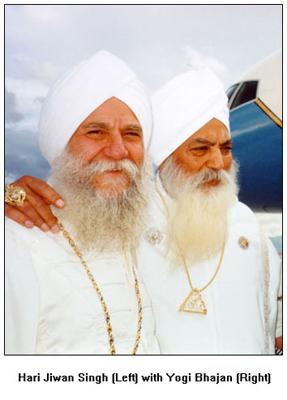 Have you ever wondered how Yoga and Sikh Dharma work together? Well, I did. So, I asked my Master.
Have you ever wondered how Yoga and Sikh Dharma work together? Well, I did. So, I asked my Master.
He answered me in pieces. It’s not that what he said was so different at different times, in fact, it was the same. I just grasped it differently as time went by.
When I asked him any question, he wouldn’t forget it, but he may not have answered me immediately. He kept trying to get me to understand my question from his perspective. After all, that’s why I came. Naturally, his perspective was different than mine, so it took some time to understand, accept, and surrender to his way of thinking. And it always took way too long for both the Teacher and the student to be on the same page. That’s just the nature of the relationship. Not to worry, as he always said, “Slow and steady wins the race.”
I had a big spiritual handicap. I needed to know what I was surrendering to before I could begin. That’s not always a bad thing. This way of thinking meant that I was hard to fool. But, on a spiritual path, especially after commitment, it becomes a hindrance in terms of time. The Siri Singh Sahib knew this about me and that I couldn’t move forward until I resolved this understanding in my mind. What I was really asking him was: why I should be a Sikh and not just a Yogi?
His first answer was what was expected, but it also shocked me. He acknowledged, “All you need to be is a Yogi, period. It’s a perfect path to elevation and infinity. And, all you need to be is a Sikh as well.” Question ends right there. But, there is a further understanding. He continued, “Yoga helps Sikhs, shouldn’t it follow that living as a Sikh should help a Yogi? That’s the truth also."
Here’s what I learned over years of study with him.
Yoga is a process of self-evaluation and perpetual work on oneself to “get better.” In Yogic terminology, it’s called “Awareness and Ascending Force.” Ascending Force is human effort or duty with full attention. When a spiritual aspirant executes his/her duty, God sends down blessings as a reward. Usually, after a taste, future rewards don’t come down as fast as desired. So, somewhere a practicing Yogi must deal with these frustrating periods of stagnation. Many succumb to these unfulfilled desires. But, Yoga also provides the energy and will to keep up in pursuing this duty. Well, this sounds al lot like what our Gurus taught. And that’s because it is. Wonderful! Now I see how Yoga works, but how does that lead to a “mutual admiration society with Sikhism?” Here’s how I finally deeply understood the mutual benefit.
I was a natural to be a Yogi. I always wanted to know why: why I thought as I did; why I did somethings automatically and whether or not they were good for me. Yogis know why. They are perfect at it. They are the smartest people on earth. They have an understanding of how this world works which is second to none. They are the source. Yogis in deep meditation have figured everything from esoteric mudras to earthly feats like how to go to the bathroom properly, and all stops in between. This is who I wanted to be.
Along the way I met a Yogi who was also a Sikh, our blessed Teacher. He taught me that all I had to do was surrender to my Guru and I would become a perfect Yogi. And, here’s the best part, I would come to understand everything that the Yogis knew as a byproduct of my surrender.
My journey didn’t have to be a struggle during periods of rewardless service. The Guru became my friend, my helper and my mentor. I was not alone. The Guru would reward me in ways I couldn’t reward myself with just Yoga alone. This way of thinking not only made my spiritual journey speed up exponentially, but allowed me to enjoy the rewardless periods as well.
Yes, Sikhism, like all religions, is a process of “dos and don’ts.” There are a lot of rules. Yoga is the practice of just being. But, in Yoga at a deep level of self-evaluation, it becomes the same process of dos and don’ts. After all, as a Yogi becomes aware of his/her limited self, it becomes necessary to follow rules for change just as in Sikhism. Yogis don’t become smart by staying the same.
I became a Sikh when I surrendered to the Guru. This surrender also allowed me to became a Yogi. If you argue that there is a difference, it just means that you haven’t understood each deeply enough. Yoga gave me the awareness, energy, and will. Sikhism gave me the focus to “keep up” through awareness, the continuing ”right focus” (dos and don’ts) of this energy, and the ability to know my will would be strong enough to succeed.
The Siri Singh Sahib instructed me to do a powerful pranayam. It was an advanced practice. In fact, he taught it to everyone in the Dharma. The “one breath per minute” meditation (inhale for 20 seconds, hold the breath in for 20 seconds, slow exhale for twenty seconds, and continue this for up to 2½ hours.) This pranayam has been the answer to the question proposed above. The Master would ask me occasionally, “Are you doing this meditation?” I remember one time when I told him I was taking some time off to do something else; he didn’t say a word, just lifted his head and raised his right eyebrow. I got his message. I made sure that I didn’t let up again. The continued practice of this meditation answered my question. The answer was inside myself; verifiable, self evident, and concrete. And here’s the next (and best) part, the answer not only was the intellectual answer giving me the confidence to move on, but it showed me how to move ahead without the burden of my previous handicap of having to know 'why' before doing. This pranayam made me a better Sikh, and being a better Sikh made me a better Yogi.
And, here’s the next best part, with the Guru’s help I am not alone. The Guru is much kinder to me than I am to myself; the Guru reminds me when I don’t want to remind myself, and the Guru reminds me that “good or bad” I belong to him. So, with all my faults, my efforts will be rewarded.
Sikhism has allowed me to enjoy the process. This identity, combined with seva, augments and defines Yoga, and vice versa.
For me, my Master was the Guru’s servant. All I had to do was serve my Teacher by surrendering to his will. I serve the Guru’s will through him. This is why I do what our Teacher wants me to do. As a reward, this is how I am able to understand what the Master taught and write these letters to the Sangat.
It’s no secret; it’s not because of any greatness in me, and it’s not because I possess any special talents, it’s simply because I continue to serve our Teacher. I am so grateful for the opportunity which the Guru has provided me. Stay tuned for more.
In Humility of Service and Gratitude, Hari Jiwan Singh Khalsa
